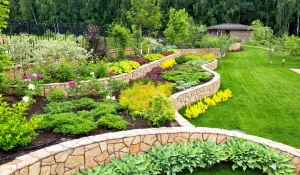The Importance of Sustainable Kitchen and Garden Practices

Growing your own vegetables in a home organic garden is a great way to practice sustainability. Purchasing produce from grocery stores causes a large carbon footprint due to the trucks that transport it.
Creating a compost pile and recycling your kitchen scraps keeps the soil in your garden healthy and minimizes waste. This is an easy and enjoyable project for the whole family.
Recycle and Repurpose
One of the biggest steps toward a sustainable kitchen and garden is to recycle and repurpose items that would otherwise be thrown away. Reusing common household items like jars for storage, old clothing as cleaning cloths or even old cans as seedling starters is an easy way to cut back on waste.
Reusing materials also reduces the need to create new products. Repurposing is a bit different from recycling because it uses the original item, but for a new purpose rather than melting it down to be made into something else.
Home gardens are a vital source of food for marginalized families. They provide a diversified diet that can reduce malnutrition, and boosts the bioavailability and absorption of essential nutrients. They also help communities manage their food and income security and build resilience in the face of economic crisis and conflict. Moreover, they contribute to gender equality by giving women and girls the opportunity to take control of their own food supply.
Plants
Whether you live on acres of land or in a high-rise condo with just a few pots of peppers, everyone can adopt sustainable planting habits and natural garden care. These practices can reduce the need for synthetic fertilizers, pesticides and other chemicals that pollute soil and waterways.
Plants not only add color and beauty to the home but also help to improve air quality. They also provide a sense of achievement and satisfaction for those who grow them. For instance, many people find that planting a vegetable garden is a great way to reduce anxiety, depression and body mass index while providing delicious fresh vegetables and herbs.
Composting is another simple and cost-effective way to repurpose kitchen scraps and green garden ‘waste’. This can be done on a small or large scale, and there are a variety of composting systems, worm farms and bokashi bins to suit all spaces and situations. In addition, growing open-pollinated varieties allows you to save seeds and regrow plants year after year, saving you money and reducing waste.
Biodegradable Items
Biodegradable items are those that break down in a natural environment without causing pollution. They include leftover foods, plant materials, animal carcasses and other organic waste. Biodegradable materials can be broken down into carbon dioxide, water vapor, methane, compost, humus and simple organic molecules by microorganisms.
These substances can be used to make shopping bags, food containers and trays. They are also used to make disposable catering service ware and medical products. Biodegradable plastics are made of plants, and they don’t contain harmful chemicals such as BPA, phthalates and bisphenol-A, which can be found in traditional plastics.
The manufacture of these polymers requires less energy and fossil fuels than petrochemical plastics, which reduces greenhouse gas emissions. However, some of these products break down too quickly and can cause environmental problems if they are dumped in landfills. In addition, they may be contaminated with pesticides from the crops that were sprayed to make them. This can lead to the release of methane, which is 25 times more powerful than CO2. Landfill methane is a major source of greenhouse gases and contributes to climate change.
Natural Cleaning Products
Growing your own fruits, vegetables and herbs in a garden, in containers on the porch or in the backyard is one of the most sustainable practices. Not only will your garden supply you with fresh, nutritious food, but it also helps reduce greenhouse gas emissions, since your produce doesn’t have to travel far.
Invest in natural cleaning products to replace harsh chemicals that can irritate your skin, eyes and respiratory system. While shopping for cleaners, look for certifications such as the Environmental Working Group’s Material Health Score, Cradle to Cradle, USDA BioPreferred, EPA Safer Choice and Leaping Bunny.
Another sustainable practice for your garden is water conservation. Instead of using sprinklers, collect rainfall in a rain barrel or other container to use for watering your plants. This method is more efficient than relying on a hose, which can waste water through evaporation. It also saves money and helps protect our limited water supply.






